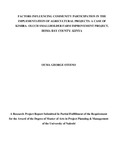| dc.description.abstract | The concept of community participation in development gained prominence in development discourse in the seventies and since then literature on the subject has grown dramatically. The incorporation of the locals in development projects has become a common phenomenon that almost every organization talks about. Related literature shows that there is very little scope of participation for common people in decision making, management and supervision of many community based development projects. Kimira Oluch Smallholder Farm Improvement Project, (KOSFIP), is an irrigation agricultural project currently implemented in Homa Bay County to enhance sustainable income levels for the rural households and thus help in alleviating poverty.
However, the participation of the local community in the activities of this project is considerably low, thereby threatening the realization of the project goal. The purpose of the study was therefore, to investigate factors influencing community participation in the implementation of agricultural projects with Kimira Oluch Small holder Farm Improvement Project (KOSFIP) as a case. The variables whose influences were examined included; project design principles; mode of resources contribution; types of implementation approaches and community capacity building strategies. The research design was descriptive survey, in which data was collected through questionnaire and interview schedule. A random sampling was done to identify 280 respondents as sample population, from a target population of 3000 farmers. From the data analyzed through descriptive statistics, the study findings revealed that; the project design principles were adequate and provided the local community with an avenue to be effectively involved in all stages of implementation. Among the design principles, stakeholder engagement rated at 61.41% by the respondents as the most effective principles which encouraged participation of key stakeholders in project implementation; that in- kind mode of resource contribution had not enhanced community participation and acceptability of the project. The results revealed that provision of labor rated at 57.5% was considered as the most essential contribution made by the community, compared to land which was rated at 42.5%; that the bottom-up approach adopted in project implementation enhanced participation since it was inclusive and consultative. Two types of implementation approaches, bottom- up and top- bottom were considered. The project was rated at 77.86% as being implemented through bottom-up approach. This is because were viewing the project as being implemented by the government in a consultative manner with the local community; and that capacity building strategies were not effective enough thereby causing differential commitment among farmers towards participating in project activities. Poor capacity building strategies rated at 67.14%. The study concluded that the apparent lack of ownership, acceptability and low level of community participation could be largely attributed to lack of cohesion among the farmers, resulting from ineffective community capacity building strategies. It was therefore recommended that; the scope of the design principles be expanded as affirmative action to focus on the youthful segment of the community so as to put them in a better position to engage fully in project activities; there is need for the local community to focus on mobilizing their own resources by identifying possible sources of revenue for scheme management; IWUA leadership should integrate bottom- up approach by creating forums for regular consultation and engagement with the farmers; and that there is need to review the structure and content of the current capacity building strategies, with a view to incorporating appropriate strategies which are community- oriented. | en_US |



